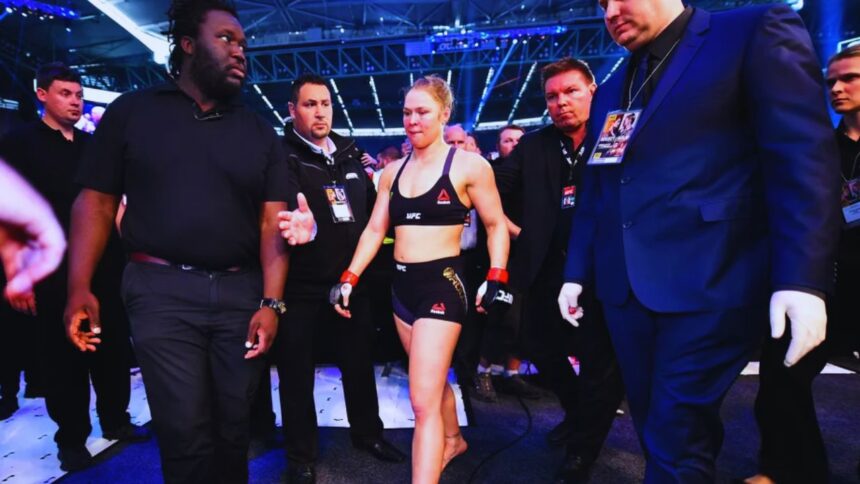In a candid interview with Valeria Lipovetsky, Ronda Rousey, the former UFC bantamweight champion, disclosed a significant detail that sheds new light on her iconic fight with Holly Holm at UFC 193. Contrary to what fans and critics may have believed, Rousey revealed that she was already concussed before stepping into the octagon that fateful night.
A Pre-Fight Struggle
Rousey’s admission adds a layer of complexity to her devastating loss to Holm. She explained that she was “out on my feet for the entire fight,” attributing this state to a brain injury sustained before the match. This revelation paints a picture of a fighter grappling not only with her opponent but also with the debilitating effects of a concussion.
A Legacy Under Scrutiny
The impact of Rousey’s concussion extends beyond the octagon. She recounted the toll her injuries took on her cognitive abilities during the fight, leading to doubts about her authenticity as a fighter. Rousey’s struggle highlights the harsh scrutiny and expectations placed on athletes, particularly those in the limelight of professional combat sports.
The Burden of Expectation
Throughout her career, Rousey faced immense pressure to maintain her status as a dominant force in the world of MMA. However, she revealed the toll this pressure took on her mental and emotional well-being. The disillusionment she experienced following her loss to Amanda Nunes at UFC 207 speaks volumes about the fragile nature of athlete-fan relationships.
Wrestling with Identity
Rousey’s journey is not just one of physical prowess but also identity and purpose. She grappled with the conflicting desires to please her fans and protect her well-being. Her decision to keep her injuries hidden underscores the sacrifices she made to pursue her passion and cement her legacy in the sport.
Calls for Greater Oversight
Rousey’s revelations also raise questions about the efficacy of current regulatory practices in combat sports. The oversight provided by athletic commissions may not adequately safeguard the health and well-being of athletes. There is a pressing need for more comprehensive measures to protect fighters from the long-term consequences of head injuries.
A Story Untold
In choosing to disclose her struggles with concussions, Rousey acknowledges the complexity of her journey. Her decision to share her story in her autobiography, “Our Fight,” reflects a desire to provide a nuanced understanding of her experiences. Rousey’s narrative transcends headlines, offering readers a deeper insight into the challenges she faced both inside and outside the octagon.
Looking Ahead
As Rousey embarks on the next chapter of her career, her story serves as a reminder of the human side of professional athletes. Behind the glitz and glamour of the spotlight lies a person grappling with doubts, fears, and vulnerabilities. Rousey’s courage in sharing her truth paves the way for a more empathetic and understanding discourse surrounding the world of sports.
Impact Beyond the Octagon
Beyond her journey, Rousey’s confession prompts broader conversations about athlete safety and well-being. The prevalence of concussions in combat sports underscores the urgent need for enhanced protocols and support systems. Athletes like Rousey shed light on the challenges they face, inspiring advocates and policymakers to enact meaningful change.
A Catalyst for Change
Rousey’s willingness to speak out about her struggles challenges the stigma surrounding mental health and injury in sports. Her story encourages athletes to prioritize their well-being and seek help when needed. Moreover, it galvanizes fans and stakeholders to advocate for reforms that prioritize athlete safety above all else.
A Champion’s Legacy
Ronda Rousey’s revelation about her concussion before the fight with Holly Holm at UFC 193 adds a new dimension to her storied career. Her journey embodies resilience, determination, and the courage to confront adversity head-on. As the sporting world grapples with the implications of her confession, one thing remains clear: Rousey’s legacy transcends the confines of the octagon. Her impact resonates far beyond the realm of sports, serving as a beacon of hope and inspiration for athletes and fans alike.
With her bravery and honesty, Ronda Rousey invites us to reconsider what it means to be a true champion. Her legacy reminds us that strength is not just measured in victories but in the courage to confront our vulnerabilities and strive for greatness, even in the face of adversity. As we reflect on Rousey’s journey, may we all find the strength to embrace our struggles and emerge stronger, both inside and outside the arena.




